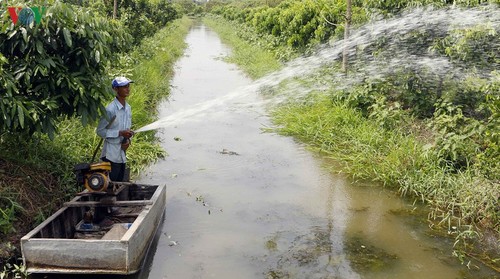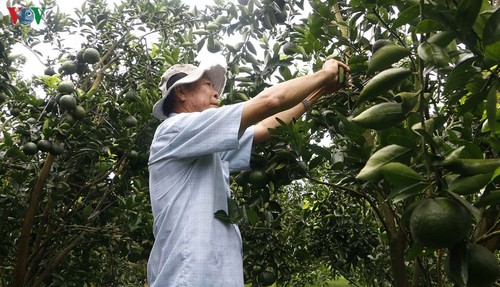 Every year, Can Tho city produces more than 100,000 tons of fruits. Every year, Can Tho city produces more than 100,000 tons of fruits. |
70-year-old Châu Van Tinh of Truong Thanh commune was sipping coffee with village friends and telling them what he learned at a recent training course covering IT, new farming techniques, and using new and technology to grow fruit trees.
Tinh’s family has more than 8,000 square meters of fruit trees. In the past, it was difficult to sell his products, whose prices were always unstable. When his trees suffered from pests or diseases, he would spray them with insecticide. If they lacked fertilizer, he would buy more fertilizer. This didn’t help improve productivity but increased production costs.
Tinh never thought of changing his traditional methods of production to meet market demands.
But after attending a local training course on new farming techniques, he sees the value of understanding and adapting to what the market wants. Above all, it’s important to use new technology to improve productivity and quality.
Tinh said: “The training course helped me understand that if chemical fertilizers or pesticides are over-used or abused, it will affect my profits because consumers will no longer want to buy my agro-products. The course also provided me useful things like better organic fertilizer.”
Nguyen Van Nhen, a farmer in Thoi Lai district, said the training course changed his way of thinking about production, market trends, consumer demand, and pricing.
He learned ways to give his fruits a better position in the market and make them more acceptable to consumers.
 The Mekong Delta produces 65% of Vietnam’s fruit exports. The Mekong Delta produces 65% of Vietnam’s fruit exports. |
Nhen said his products must be good enough to compete with the imported items that are flooding the market.
“I have searched on the Internet for more information on prices, import markets, farming techniques, economic efficiency, and output and applied it to my production and found it effective,” said Nhen.
Trinh Hoang Thoi had to wait so long to attend the training course. But at least now he knows how to use a computer and how to make his fruits acceptable to consumers.
Thoi said, “the training course told me how the market and pricing have changed and what farming techniques result in better farm produce, thus increasing profits. The training course gave me information I can use to help other villagers.”
The Mekong Delta produces 65% of Vietnam’s fruit exports, much of it going to demanding markets. The region’s center, Can Tho city, produces more than 100,000 tons of fruits every year. It has organized many training courses to teach local farmers advanced farming techniques and ways to build and promote a brand.